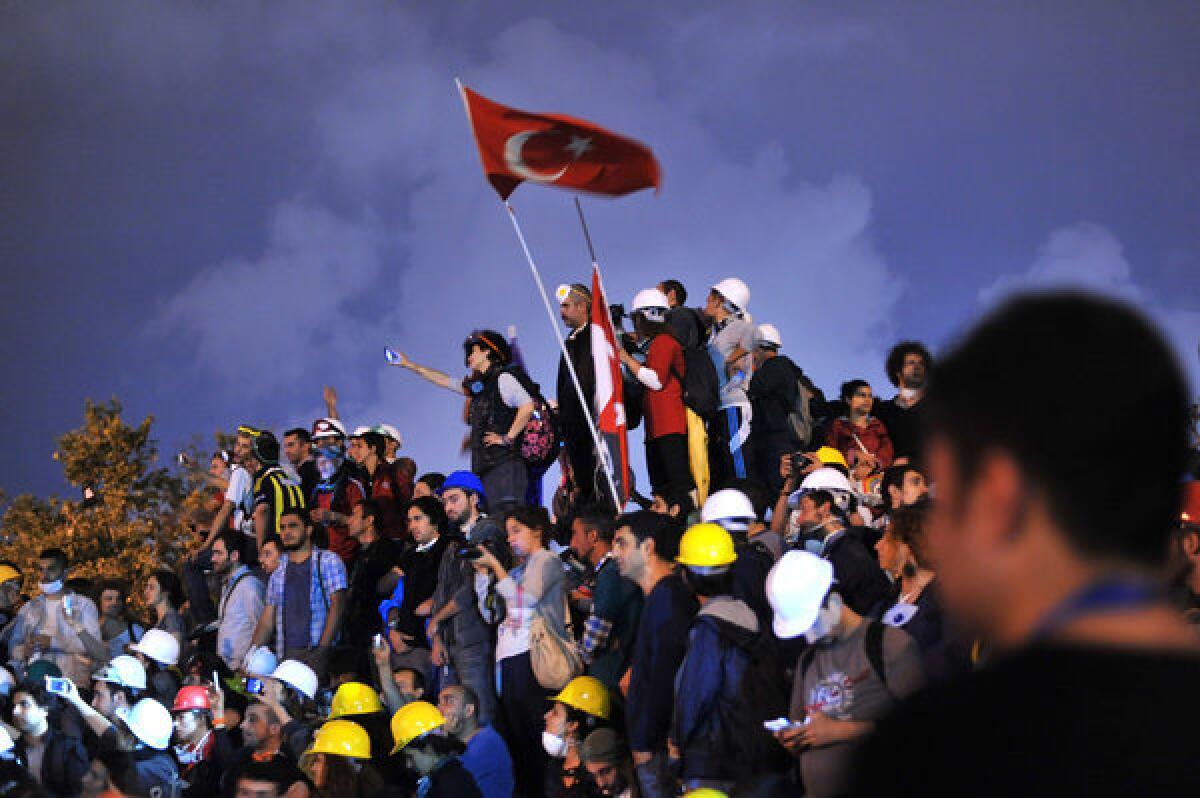Turkey’s Erdogan issues ‘last’ warning to Istanbul protesters

- Share via
ISTANBUL, Turkey – Turkish Prime Minister Recep Tayyip Erdogan on Thursday issued what he said was a final warning: The protesters in Gezi Park would be removed within 24 hours, he told a meeting of his Justice and Development Party in the capital, Ankara.
“Our patience is at an end,” Erdogan was quoted as saying on the English-language website of the Turkish newspaper Today’s Zaman. “I am making my warning for the last time. ... We cannot wait any more because Gezi Park does not belong to occupying forces but to the people.”
The demonstrations, which began as a sit-in to protest plans for a development project in the park, have escalated into nationwide protests against Erdogan’s government.
In Gezi Park, protesters waited nervously Thursday. Scores of police were deployed in adjoining Taksim Square. As dawn broke, some stood in the center of the square; others slept, their faces pressed against the windows of the vehicles that bused them there.
“Today or tomorrow they will come,” said Gusel, a recent graduate of an Istanbul university who asked that his last name not be used for fear of arrest. “I have seen how the police act. We are all scared.”
Gusel said he was scared of the tear gas canisters that could come through the sycamore trees stretched skyward above him, scared of the plastic bullets and stun grenades that could come as well, and scared of Erdogan.
“We have not responded to punches with punches. From now on, security forces will respond differently,” the prime minister was quoted as saying late Wednesday after a meeting with a group of protesters.
The statement prompted outrage from advocacy groups that have urged the Turkish government to de-escalate the crisis, which Amnesty International said has given rise to “appalling levels of violence.”
“Prime Minister Erdogan’s outrageous statement is nothing short of a provocation, only likely to lead to more violence and more injured protesters.” Andrew Gardner, a Turkey researcher at Amnesty International, said in a statement.
Throughout the crisis, the incendiary rhetoric of Erdogan, who rose to power more than a decade ago, has exposed schisms in his Justice and Development Party, or AKP.
Through two weeks of civil disobedience the government’s response has appeared schizophrenic, with Erdogan’s comments juxtaposed against President Abdullah Gul’s and Deputy Prime Minister Bulent Arnic’s more conciliatory statements.
While Erdogan talked of responding “to punches with punches,” senior ruling party officials announced late Wednesday on the prime minister’s behalf that there may be a referendum on the development plans for the park.
“We will respect the results of the referendum and do what the people decide in Istanbul,” said the party’s deputy chairman, Huseyin Celik, according to state media.
The protesters in Gezi Park argue that the government has betrayed them too often. They talk of the recent arrest of nearly 50 lawyers who were defending protesters. They complain that after the governor of Istanbul promised that protesters would not be harmed, the police stormed Taksim on Tuesday, three times entering Gezi Park.
“The thing is, how will they hold a referendum on this? What will the question be?” asked Temir Karadeniz, an activist. “I’m sure the government will manipulate the vote, twist the question.”
Erdogan, who has won three consecutive elections and retains considerable support, has dismissed the protesters as hooligans and militants.
Though there are radical groups participating in the protest -- the Revolutionary People’s Liberation Front, for example -- they thus far do not define the movement, an Occupy-style demonstration driven by a secular, nationalist strand of nonviolent youth alienated by what they see as the creeping religious conservatism of the ruling party.
“Erdogan’s approach has inflated the radical groups’ view of themselves, while radicalizing the mainstream groups,” said Hugh Pope, head of the International Crisis Group’s Turkish wing.
“The way to start dealing with the crisis is to engage with the mainstream opposition, and ensure they feel their grievances have been listened to -- as Gul did,” he said.
Veins of lightning streak through the sky above Gezi Park. People quietly sweep rubbish into piles. Hard hats are on, gas masks hang from necks. A small group plays football on the fringes of Taksim Square, their gas masks demarcating goal posts. Police officers’ armored vehicles come to life.
The sense in the park, and on the streets of Istanbul, is that the demonstrations may have reached their final act. Everyone is holding his breath, waiting for whatever comes.
Ezgi, who also didn’t want to give her last name, is busy taping a flag to a tent. She is part of a Turkish youth group camped out in the park. Nearby, two men use trenchers to turn soil, planting a bed of flowers.
“The police will come with their gas and noise bombs,” she said. “I’m not afraid; I trust the people here to protect me.”
ALSO:
Snowden alleges U.S. hacking against China, Hong Kong
Zimbabwe’s Mugabe calls election but his rival rejects the date
Global Voices: Fukushima made ex-premier a ‘no nukes’ crusader
Johnson is a special correspondent.
More to Read
Sign up for Essential California
The most important California stories and recommendations in your inbox every morning.
You may occasionally receive promotional content from the Los Angeles Times.










